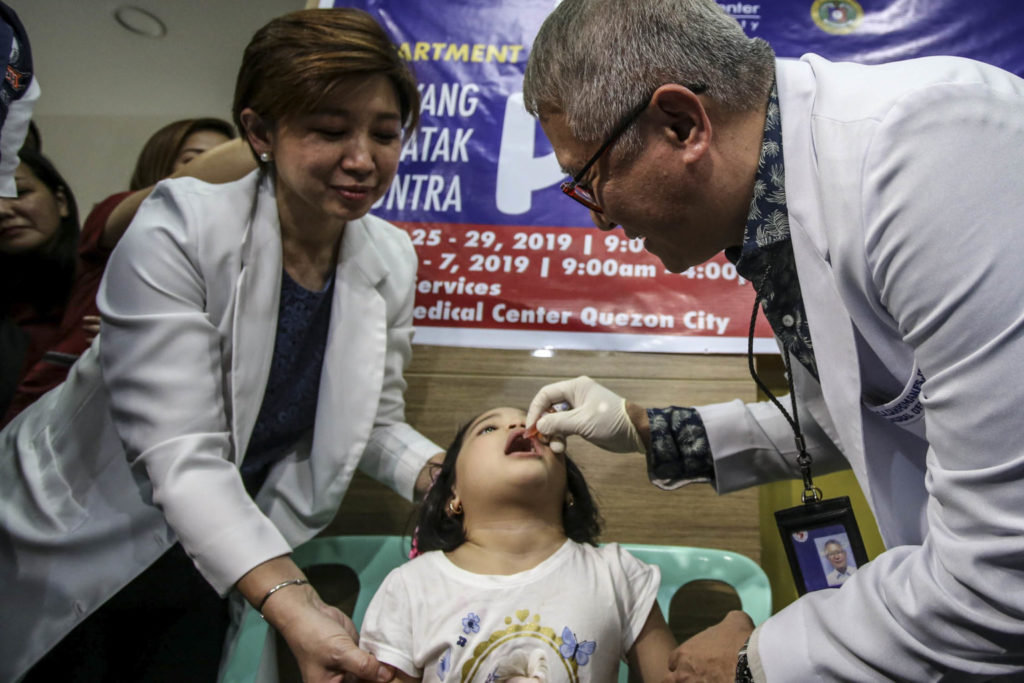The Department of Health (DOH) urged local officials to ramp up their immunization programs once lockdown restrictions in their areas are eased, after the outbreak of the new coronavirus disease (COVID-19) caused the vaccination rate nationwide to decline by about half to 7 percent in the first quarter of the year.
The DOH National Immunization Program manager, Dr. Maria Wilda Silva, said that from January to March, fully immunized child coverage across the country dropped to an “all-time low” of 7 percent due to the lockdown.
She noted that the figure is about half of the average 16-percent coverage for the period prior to the outbreak, and way below the ideal 24-percent coverage to reach the 95-percent coverage rate by year-end.
“This is very low because of the disruption from both the supply and demand side,” Silva said in her online press briefing on Friday.
She said “there is a disruption in the delivery of immunization services at all delivery points. So, whether the disruption is great or small, we do not see a uniform disruption in all of the regions.”
“We haven’t experienced this number [in] a very, very long time. We had experienced vaccine hesitancy in the past, but 7 percent is very low because of this COVID-19 crisis,” she said.

In this November 29, 2019 photo, DOH Secretary Francisco Duque III administers oral polio vaccine on a child at St. Luke’s Medical Center in Quezon City. | Inquirer File Photo
Health centers
The health official explained that the drop in the vaccination rate was either because parents were afraid to bring in their kids to the health centers or the health centers were closed.
In areas where the health centers were nonoperational, Silva said this was because the workers assigned there were “pulled out to assist in COVID-19 efforts.”
But in other areas, she said, the enhanced community quarantine “worked to their advantage” since health care workers were able to provide “integrated community services” while the public was kept in their homes.
The services provided included tuberculosis treatment, family planning consultation, and immunization.
“But this is not true all over the country. In some areas where the threat of COVID-19 is very high, immunization was temporarily discontinued to give way to the COVID-19 effort,” she said.
Virus case updates
Silva said that since immunization is an essential health care service, their “tall order is to do catch-up immunization in all areas” with the safety of health workers in mind.
In her online press briefing on Friday afternoon, Health Undersecretary Maria Rosario Vergeire reported 215 new COVID-19 cases, bringing the nationwide total to 2,091.
At 144 cases, the capital region still accounts for the majority of the new cases.
The number of recovered patients climbed to 2,460 with the recovery of 123 more patients.
The death toll increased to 806 as 16 more patients succumbed to the severe respiratory disease.
The Department of Justice (DOJ), for its part, reported that eight inmates of the Correctional Institute for Women (CIW) in Mandaluyong City have recovered from COVID-19.
Undersecretary Markk Perete, DOJ spokesperson, said, “They [the prisoners] will only be allowed to return to their original stations after a second test confirms their negative status.” They are currently at the isolation unit called “Site Harry” at the New Bilibid Prisons complex in Muntinlupa City.
On Thursday, Perete reported 117 confirmed cases—40 from New Bilibid and 77 from CIW—as well as 31 suspect cases and 80 probable cases.
Four prisoners have died of COVID-19, while five others—apart from the eight CIW inmates—have either recovered or since tested negative. —WITH A REPORT FROM JEROME ANING

